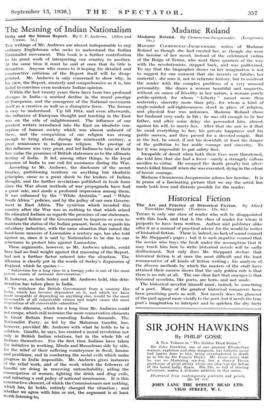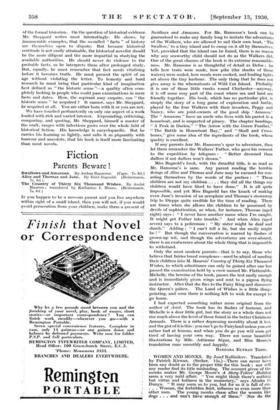Historical Fiction
The Art and Practice of Historical Fiction. By Alfred. Tressidder Sheppard. (Toulmin. 12s. 6d-) TIIERE is only one class of reader who will be disappointed with this book, and that is the class of reader for whom it purports to have been written. Author and publisher alike offer it as a manual of practical advice for the would-lie writer of historical fiction. There is, indeed, no lack of sound counsel in Mr. Sheppard's pages ; but it is such negative counsel that the novice who buys the book under the assumption that it may teach him how to write historical novels will be sadly disillusioned. Not only does Mr. Sheppard declare that historical fiction is at once the most difficult and the least remunerative of all kinds of fiction writing ; his analysis of the diverse methods by which the masters of the craft have attained their success shows that the only golden rule is that there is no rule at all. The one clear fact that emerges is that historical novelists, like poets, are born, and not made.
The historical novelist himself must, indeed, be something of a poet. Many of the greatest historical romancers have been practising poets as well. Not merely does the glamour of the past appeal more vividly to the poet, but it needs the true poet's imagination to interpret and to quicken the dry facts
of the formal historian- On the question of historical evidence Mr. Sheppard writes most interestingly. He shows, by innumerable examples, that the so-called " facts " of history are themselves open to dispute. But because historical certitude is not easily attainable, the historical novelist should be the more diligent and the more impartial in studying the available authorities. He should never do violence to the probable facts, as he interprets them after prolonged study. But, equally, he must remember that fact needs vitalising before it becomes truth. He must present the spirit of an age without violating the letter. To honesty and hard research he must bring that particular kind of imagination best defined as " the historic sense "—a quality often com- pletely lacking in people who could pass examinations in mere facts and dates. How, the aspirant may enquire, can " the historic sense" be acquired ? It cannot, says Mr. Sheppard, be acquired at all. You are either born with it or you are not.
We have touched perfunctorily on only one aspect of a work loaded with rich and varied interest. Expounding, criticising, comparing, and quoting, Mr. Sheppard, himself a master of the craft, ranges with infectious gusto over the whole field of historical fiction. His knowledge is encyclopaedic. But he carries his learning so lightly, and salts it so piquantly with humour and anecdote, that his book is itself more fascinating than most novels.











































 Previous page
Previous page